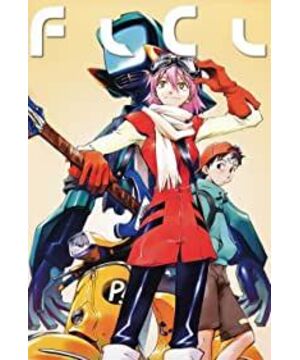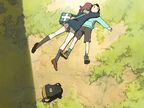After the end of the first week, I deeply felt that FLCL, an extremely experimental radio wave, was destined to be interpreted in multiple ways. However, this is where the FLCL excels. Under the bizarre performance techniques, in the same refreshing rhythm of a roller coaster, everyone can see their dreams of adolescence, confusion, melancholy and strength.
Here's what I have to say about this masterpiece.
The first is sexual innuendo. Behind the desires expressed on the outside are various emotional crises of the teenager. Under the figurative treatment of FLCL, the sexual enlightenment of adolescence has the outer shell of the sexual organs, but inside it grows all kinds of emotional monsters. These emotions are so delicate and subtle that it is difficult to describe or categorize them in words; however, they are so turbulent that they disturb the restless mind of adolescence. Just as the first episode is on the bridge of the blue picture, the rise of Naotai's sexual desire is behind the self-doubt after the loneliness and the confusion about the future relationship.
Next is Haruko, who is cool and sassy. As said in the animation, Haruko is a product of Naota's adolescence, a crazy dream generated by the most beautiful and pure emotions (or the second disease, laugh) in the hearts of every boy and girl.
Naota's messy changes came from her arrival. When Haruko rode on Vespa and waved the bass handsomely, Naota's horns of anxiety, confusion, and melancholy also began to grow.
On the one hand, the dream of the rampage is crazy, making people carefree and empty, riding a motorcycle against the humid autumn wind, and looking at the sea that is closer than imagined; on the other hand, it brings up and down mood changes, which hide Under the band-aid, hiding in the hat, only you know.
These negative and subtle emotions pile up, and at some specific moment, the dam will eventually collapse. Yet in moments like these, the hot-blooded dreams of adolescence arrive on motorcycles and hit them hard with a bass. Only children, because of their dreams, stand up bravely when they are knocked down, and become more courageous when they fail. Dreams bring us courage and hope, just as Naota once said that Haruko made him realize that there is another world beyond the thick fog when he burst into Haruko's arms and cried bitterly. Haruko's reappearance brought him the courage to live and love, and he was willing to let go of everything for his dream to wander the streets. But this kind of unrealistic dream belongs only to the passionate adolescence. Haruko pulled her horn from the top of Nori Mei's head and said disdainfully that it was too small, and turned to leave. It is precisely because the dream preference also belongs to the reckless and pure young people, and the dream in the adult world is more like a memory of helplessness and pain.
Let's talk about the ending. I really like the ending. This is true growing up.
I'm not an adult, don't fucking try to make me give up with reasoning.
I am just a child, but children also have their own judgments of good and evil. I have to listen to my heart and make what I think is the right choice.
No longer wanton and willful, holding up two guitars to fight with Haruko, it is the growth of the heart, not the vanity of pretending to be mature, nor the rebellion who wants to be stubborn.
In the end, I love you. I like the gorgeous and crazy youth you brought me, motorcycles, guitars, baseball, the sea. Also like those confused, confused, frustrated, melancholy.
I know that I shouldn't be so crazy anymore, growing up like a dream, and the unrealistic madness disappears when I wake up. I waved goodbye to my dream in my second year, I love you, it's time to move on. But fortunately, I'm still a child, Never Knows best.
View more about FLCL reviews











